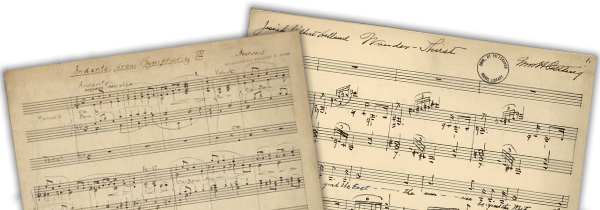
“My Hopes Have Departed Forever” was entered for copyright deposit on August 4, 1851, by Firth, Pond & Co of New York. The text is a paraphrase of verses two through four of Percival’s “The Winds of the Winter Are Over.” The text also appeared under the same title in a sheet music edition issued by John Cole of Baltimore in 1822 or 1823. It is possible that Foster knew the song from childhood.
The title page on some of the early published sources indicate it was “written and composed by a lady.”
According to Evelyn Foster Mornweck’s The Chronicles of Stephen Foster’s Family:
In 1851, after the publication of “Oh! Boys, Carry Me ’Long,” Stephen produced “My Hopes Have Departed Forever,” “Laura Lee,” “Old Folks at Home,” a translation of Franz Abt’s “In the Eye Abides the Heart” with the melody arranged by Henry Kleber, “Eulalie,” “Farewell, My Lilly Dear,” and “Willie, My Brave” which was dedicated to Mrs. A. L. Robinson. If the first title sounds familiar, perhaps the reader will remember that back in 1836, Henrietta wrote to William that she had just learned a “beautiful new song” entitled “My Hopes Have Departed Forever.” The original version of this song, according to the researches of Elliott Shapiro, of New York City, was published in 1822 or 1823 by John Cole of Baltimore, under the title “The Winds of the Winter Are Over,” with words by the “American Bard, Percival” (James Gates Percival), and “adapted to a much-admired Irish Melody” which turns out to be “The Pretty Girl Milking Her Cow,” the same air which Sir Thomas Moore set to his verses, “The Valley Lay Smiling Before Me.”
Whether Stephen’s publication is set to an air of his own, or a new arrangement of the song which Henrietta mentioned, is not known. In his own bound volume of songs, preserved by his daughter Marion and now in the Foster Hall Collection, University of Pittsburgh, Stephen has written on the title page of this song, “Arranged by S. C. Foster.” Firth, Pond, the publisher, states that it is “Written and Composed by a Lady.” Evidently, Stephen did not care publicly to acknowledge himself even as the arranger. It is an exceedingly maudlin old song. It is strange to think that the author of these words, James Gates Percival, was a soldier, and a brave one, who lost his life on an exploring expedition in Wisconsin in 1857. So far, no edition contemporary to Henrietta’s letter of 1 836 has come to light. In 1836, Stephen’s lighthearted young sister pronounced “My Hopes Have Departed Forever” “beautiful,” probably because it is so sad and dreary; it is a well-established fact that happy young folks greatly relish singing songs of anguish and hopeless love.